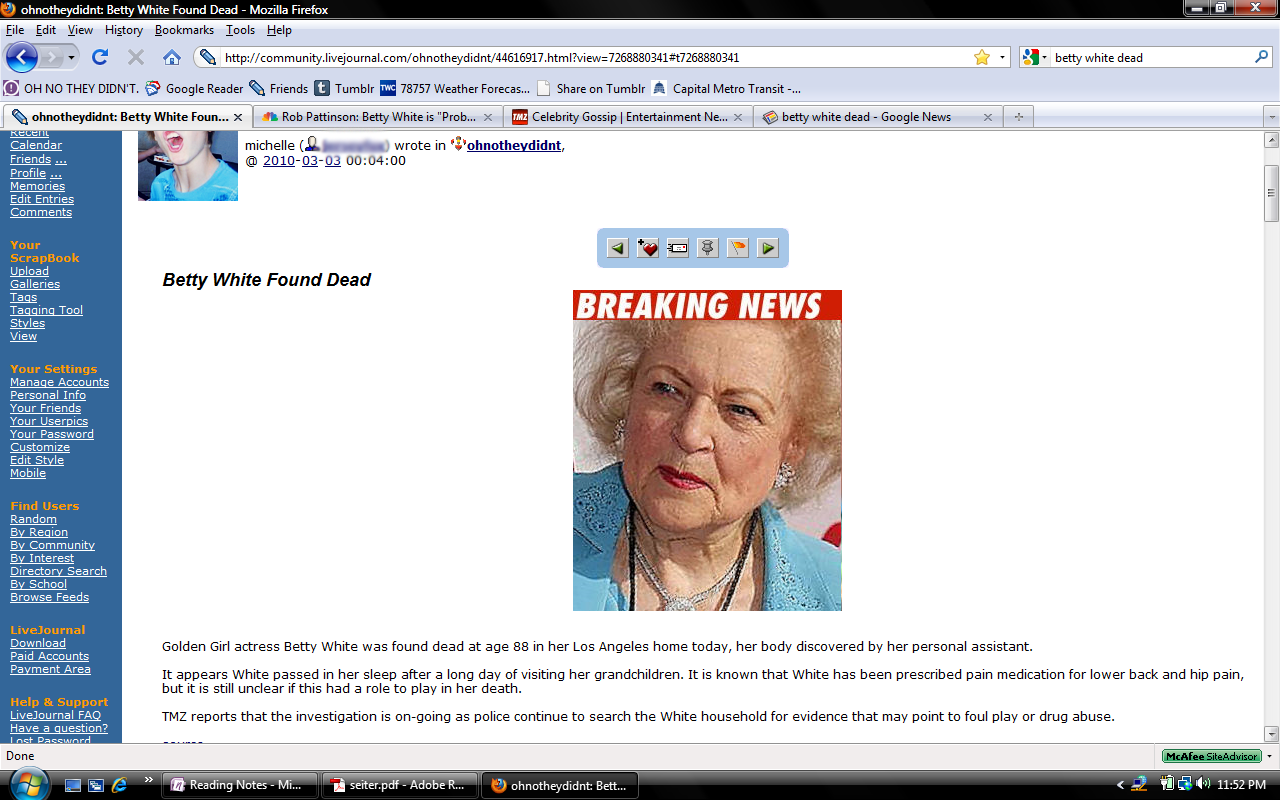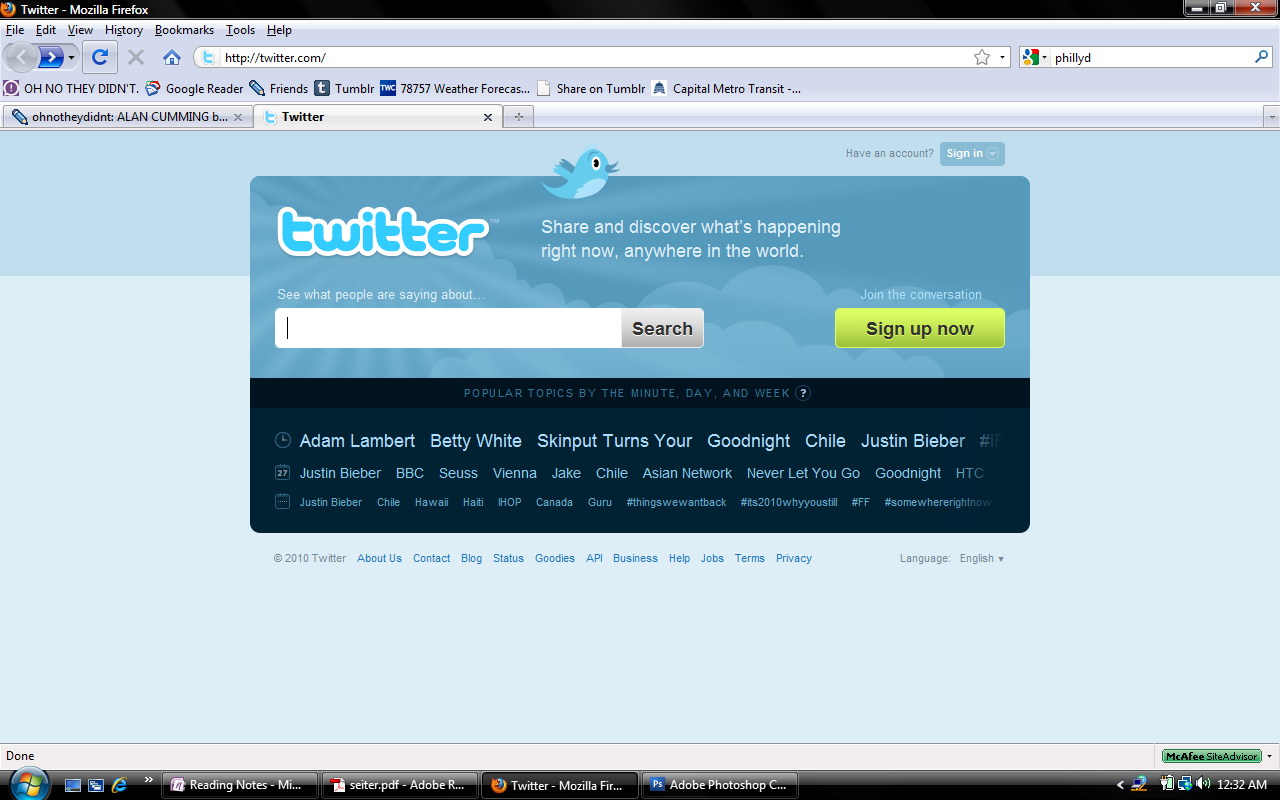“Betty White Found Dead” and Other Fake Gossip
Carolina Hernandez / FLOW Staff

On March 2nd, 2010, Betty White was found dead in her home, after a day of visiting her grandchildren. Or so said the story on Oh No They Didn’t, a user-generated content website featuring gossip and entertainment news. In recent years, the site has become one of the more important sites in the world of celebrity gossip because of its open nature, encouraging readers to post their own stories and engage in extensive conversations in the comments section. With its 100,000 plus members, it stands as the largest community on LiveJournal.1 However, even with several moderators watching over the group, the sheer number of posts submitted daily means false stories occasionally slips through the cracks. These stories are generally caught pretty quickly and deleted. Unfortunately, the news often still spreads pretty fast, largely thanks to Twitter, but also due to other websites picking up the story without checking the source. This is essentially what happened with the Betty White article. The quick spread of the news that Ms. White was dead highlights some of the problems with many celebrity gossip websites and blogs, which largely have become more interested in breaking a story than actually being accurate.
Before looking at how this rumor spread, though, it is important to note why the story was approved by the moderators and why people believed it at first. When the prankster originally submitted the post, it featured an article about the actor Jeremy Renner.2 After a moderator approved it, the original poster edited the entry and turned it into the rumor about Ms. White. But what made it believable? TMZ was credited as the source, with a falsified screencap and a made-up link used as proof that the story came from their website. Since TMZ is generally considered a reputable source due to their thorough investigative practices3, readers originally believed the story without actually checking TMZ’s website. Many of the initial comments on the post were full of people expressing their grief over Ms. White’s presumed death.

However, doubt started to set in and many of the readers questioned why the story was no longer on TMZ’s website. Also, many of the details provided were clearly wrong, such as Ms. White having grandchildren. The original poster kept insisting she had taken the story from TMZ and a few accomplices backed her up on this, saying they had also seen the article on TMZ first. They even went as far as to create a full screencap of the story on TMZ as proof, but several astute readers noted the difference between the font used in the fake screencap and the one actually used by TMZ.5 While this kept the rumor going on a little longer, it left many readers confused as to what to believe.

It did not help that while some were trying to discern the veracity of the story, it had already started to spread online, largely with the help of Twitter. ‘Betty White’ became a trending topic, and went as high as the second spot within roughly an hour after the story first appeared. Before it was deleted, the post on ONTD received more than 1700 comments from those expressing either their sadness at the possibility of Ms. White’s death or their frustration with the person who started the rumor. After it was deleted, ONTD members flocked to another post to continue the conversation, with many hoping that someone would be punished for starting the awful rumor about Ms. White.6 Eventually the rumor was debunked, but the damage was done. The story had spread far and wide and required several reputable sources to confirm that Ms. White was not dead before people were satisfied.

Ms. White is not the only victim of a rumor spread by ONTD pranksters. More recently, another ONTD troll posted a story saying that Michael Lohan had tweeted that his daughter Lindsay was HIV-positive, once again including an altered screencap as supporting evidence.7 Unfortunately, this story spread even further and was picked up by many major news sources. While most didn’t believe Ms. Lohan was actually HIV-positive, almost all the news sources that picked up the story were sure that Mr. Lohan had actually tweeted the remark and simply deleted it soon afterwards, even though he kept insisting he must have been hacked. Almost no one outside of ONTD even considered the possiblity that the screencap was fake. Eventually, one of the maintainers of ONTD posted an apology and telling the truth about what happened, while also criticizing other gossip sites for spreading the story without investigating.8
While it may seem silly and almost hypocritical of ONTD to criticize others for not investigating their stories properly, I believe they are allowed to make such criticisms. Even though the site has become a major player in the online gossip world, it plays a very different role than most other sites. ONTD has always been more of a round-up of entertainment news and gossip, plus plenty of snarky commentary to along with it. It rarely claims to be the source of any news or gossip, even if plenty of blogs, such as Perez Hilton and Best Week Ever, constantly cull stories from the pages of ONTD. Because of the nature of the site, it stands apart from the more journalistic based blogs that repeatedly tout inside sources and exclusives. ONTD is more about the community and the conversations formed around the stories.9 The other gossip hounds in the online sphere should keep this in mind next time they consider copying another story from them.
Image Credits:
1. ONTD logo
2. Author’s screencap
3. Author’s screencap
4. Author’s screencap
Please feel free to comment.
- http://news.livejournal.com/124116.html [↩]
- http://maisontv.livejournal.com/69671.html [↩]
- Petersen, A.H. (2010). Smut goes corporate: TMZ and the conglomerate, convergent face of celebrity gossip. Television and New Media, 11 (1), 62-81. [↩]
- I would like to acknowledge the slight irony in using screencaps in an article discussing the fallibility of screencaps. I hope you trust that I have not altered these screencaps except to blur out usernames. [↩]
- http://img85.imageshack.us/img85/1465/ohnotheydidntbettywhite.png [↩]
- http://community.livejournal.com/ohnotheydidnt/44617563.html [↩]
- See http://gawker.com/5528363/the-lindsay-lohan-has-hiv-twitter-scam-that-fooled-everyone for a more thorough look at this story. [↩]
- http://community.livejournal.com/ohnotheydidnt/46756241.html [↩]
- There is even a Tumblr devoted to comments made on ONTD: http://iloveontd.tumblr.com [↩]
The other night, RIP Lindsay Lohan started trending on Twitter; I clicked to see what people were saying/linking to, and there wasn’t even a referent — apart from a few people saying that they had ‘seen it’ via an uncited AP feed. I checked TMZ just to be sure — it’s gotten to the point that I don’t believe a celebrity story unless it’s broken or verified by TMZ — and, of course, it was not.
The moral of the story? In most cases, these rumors are able to catch fire because the rumor itself meshes well with the celebrity’s established image (and recent developments in that image). Thus the idea of Michael Lohan disclosing his daughter as HIV positive (or Lohan committing suicide following the court verdict against her) seem real. Same for Betty White: old people die. (Of course, sometimes this isn’t the case at all, as evidenced by fake rumors of Jeff Goldblum’s death).
Perhaps more interesting is what compels people to start such rumors — and compels others to pass them along without authentication. I realize these are two different phenomena; the former is probably rooted in the desire to see how far your fabrication can spread, like ripples off a skipping rock. The latter, however, is a case of media illiteracy, and the general lack of vetting of information, whether celebrity-based or otherwise. If it’s on a blog — even one filled with user-generated content — does that make it true? We shouldn’t just think through what we believe about celebrities written on the internet, but what we read in general.
Thanks for bringing this fascinating phenomenon to light!
Annie – I did want to talk a little bit about why people start the rumors, especially in the case of Oh No They Didn’t, but there’s so much going on there. Definitely part of it is a desire to see your handiwork spread far and wide. More specifically in the case of ONTD, it’s also been done by those angry with ONTD as a ploy to get them in trouble. ONTD recently changed a lot about how they work, most notably starting to use ads for support, which has made some of the members unhappy and leading them to take on these guerilla gossip tactics.
Great article, Carolina! I especially like that you bring up the issue of responsibility/culpability in the last paragraph. A few weeks ago, I remember seeing ONTD linked to on the IMdB homepage for and it occasionally gets linked back to from The Huffington Post. Yet, as you said, ONTD works more on the level of commentary than reportage.
In response to Annie’s point that the rumors work because they seem true, I wonder where my favorite fake celebrity death rumor falls in that line of thinking: Jeff Goldblum. Spread mostly by twitter, for one day last summer (I believe) Goldblum trended on twitter due to the false rumor of his death, but it was no ordinary death. The rumor was that he fell to his end while rock climbing. Why was this a believable death for Jeff Goldblum? Is it because the most people know about him is that he’s weird so his death should be equally weird?
Great column Carolina (sorry, I’m just catching up on Flow now since my vacation!)… Coming from a journalism background, this issue raises a lot of questions regarding “citizen journalism”, legitimacy, and authority that go beyond gossip sites as well. Thinking back to Michael Jackson’s death and the way that is was reported — originally broken by TMZ — is interesting because I remember tension between TMZ’s reporting that MJ had actually died and waiting for the LA Times and NY Times to report it. I guess I’m wondering where mainstream media sources fit into all of this and how much power their process of verification (and cultural authority) has over the legitimacy of a story.